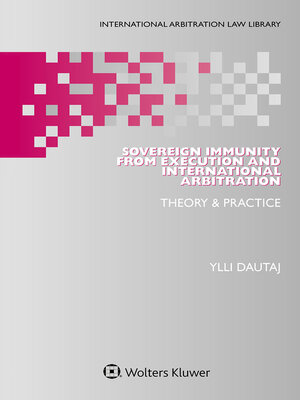Sovereign Immunity from Execution and International Arbitration
ebook ∣ Theory & Practice · International Arbitration Law Library
By Ylli Dautaj

Sign up to save your library
With an OverDrive account, you can save your favorite libraries for at-a-glance information about availability. Find out more about OverDrive accounts.
Find this title in Libby, the library reading app by OverDrive.



Search for a digital library with this title
Title found at these libraries:
| Library Name | Distance |
|---|---|
| Loading... |
International Arbitration Law Library
In international arbitration, a State's plea of sovereign immunity complicates post-award proceedings. In this invaluable book, the intersection of international arbitration law and the law of sovereign immunity—in particular, the back end of the arbitral procedure where a creditor is seeking to enforce an award against a reluctant debtor State—is thoroughly investigated. The author asks whether the current doctrinal understanding of sovereign immunity from execution and its interpretation and application in the international arbitration context sit well with a 21st-century global marketplace, and offers well-informed suggestions on what improvements are available.
The discussion proceeds as follows:
whether and how domestic legislators and courts have contributed to shaping the law on sovereign immunity from execution, in general, and in the arbitration context in particular;
whether and how domestic legislators and courts have facilitated award execution through procedural rules and court practices; and
whether and how non-legal and pragmatically driven solutions can assist an award-creditor when the award-debtor State refuses to comply voluntarily with a pecuniary award.
The book engages in an in-depth analysis of the practice of the courts in seven chosen jurisdictions—primarily the United Kingdom and the United States; then France, India, and Sweden; and then in a less rigorous manner China and Russia. These jurisdictions were selected for their strong economic positioning in the contexts of commerce, trade, and investment, and also for the major global patterns they reveal of how sovereign immunity is interpreted. A comparative method is used to underscore areas of uniformity, potential for cross-fertilization, opportunities for harmonization, and where divergence persists.
As an incomparable guide to the interpretation of sovereign immunity law in the international arbitration context, this book provides arbitrators, judges and policymakers with practical strategies that can be used to confront the plea of sovereign immunity. For policymakers and scholars, it offers possibilities for new tools, positions, amendments, and reforms in this challenging legal territory that attempts to balance the two legitimate interests of sovereign immunity and arbitral expectations.







